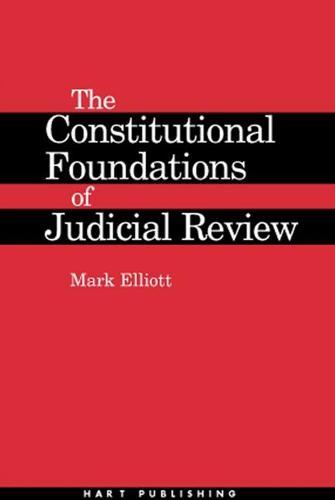Overview
Recent years have witnessed a vibrant debate concerning the constitutional basis of judicial review,which reflects a broader discourse about the role of the courts, and their relationship with the other institutions of government, within the constitutional order. This book comprehensively analyses the foundations of judicial review. It subjects the traditional justification, based on the doctrine of ultra vires, to criticial scrutiny and fundamental reformulation, and it addresses the theoretical challenges posed by the impact of the Human Rights Act 1998 on administrative law and by the extension of judicial review to prerogative and non-statutory powers. It also explores the relationship between the theoretical basis of administrative law and its practical capacity to safeguard individuals against maladministration. The book seeks to develop a constitutional rationale for judicial review which founds its legitimacy in core principles such as the rule of law, the separation of powers and the sovereignty of Parliament. It presents a detailed analysis of the interface between constitutional and administrative law, and will be of interest to all public lawyers.
Full Product Details
Author: Mark Elliott (University of Cambridge)
Publisher: Bloomsbury Publishing PLC
Imprint: Hart Publishing
Dimensions:
Width: 15.60cm
, Height: 2.30cm
, Length: 23.40cm
Weight: 0.624kg
ISBN: 9781841131801
ISBN 10: 1841131806
Pages: 296
Publication Date: 16 March 2001
Audience:
College/higher education
,
Professional and scholarly
,
Undergraduate
,
Postgraduate, Research & Scholarly
Format: Hardback
Publisher's Status: Active
Availability: Manufactured on demand

We will order this item for you from a manufactured on demand supplier.
Reviews
It is a challenging work in every sense of the term. The thesis is closely argued. It enganges the reader. It is combative. -- Paul Craig Nicholas Bamforth, Oxford University * Public Law * A stimulating and exciting discussion of argument for judicial review, which will surely be the source of much debate. -- Christian Jowett * New Law Journal *
It is a challenging work in every sense of the term. The thesis is closely argued. It enganges the reader. It is combative.Paul Craig Nicholas Bamforth, Oxford UniversityPublic LawMarch 2001A stimulating and exciting discussion of argument for judicial review, which will surely be the source of much debate.Christian JowettNew Law JournalJuly 2001
It is a challenging work in every sense of the term. The thesis is closely argued. It enganges the reader. It is combative. Paul Craig Nicholas Bamforth, Oxford University Public Law March 2001 A stimulating and exciting discussion of argument for judicial review, which will surely be the source of much debate. Christian Jowett New Law Journal July 2001
Author Information
Mark Elliott is a University Lecturer in Law at the University of Cambridge,and a Fellow, Director of Studies and Richard Fellingham Lecturer in Law at St. Catharine’s College, Cambridge.




